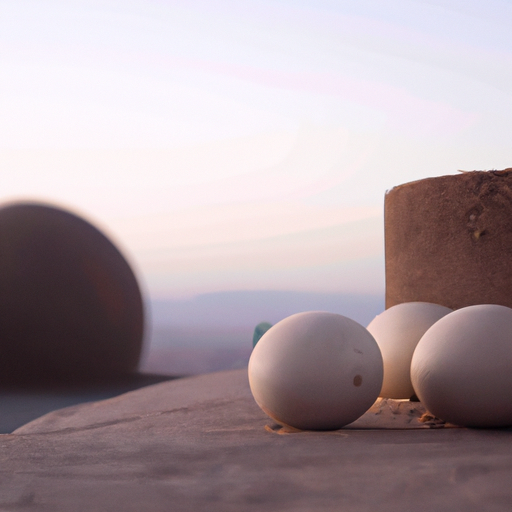
Improved Wine Quality: The Impact of Concrete Eggs in Jordan’s Winemaking Industry
Exploring the Use of Concrete Eggs in Jordan: 3 Key Reasons
Improved Wine Quality: The Impact of Concrete Eggs in Jordan’s Winemaking Industry
In recent years, the use of concrete eggs in winemaking has gained popularity in various regions around the world. Jordan, a country known for its rich history and cultural heritage, has also embraced this innovative technique. Concrete eggs, as the name suggests, are egg-shaped vessels made of concrete that are used for fermenting and aging wine. This article will delve into the three key reasons why the use of concrete eggs has had a significant impact on the quality of wine produced in Jordan.
Firstly, the unique shape of concrete eggs plays a crucial role in improving wine quality. The egg shape allows for a natural circulation of the wine during fermentation, creating a gentle and constant movement. This movement helps to prevent the formation of sediment and encourages the integration of flavors and aromas. Unlike traditional oak barrels or stainless steel tanks, concrete eggs provide a more uniform temperature distribution, ensuring a consistent and controlled fermentation process. This results in wines that are more balanced, complex, and expressive, with enhanced fruit flavors and a smoother mouthfeel.
Secondly, concrete eggs offer a porous environment that allows for micro-oxygenation. Oxygen is essential for the development of wine, as it helps to soften tannins and enhance aromatic complexity. The porous nature of concrete allows a minimal amount of oxygen to interact with the wine, promoting a gradual and controlled oxidation process. This gentle exposure to oxygen helps to refine the wine’s structure and texture, resulting in wines that are more harmonious and well-rounded. Additionally, the porous surface of concrete eggs allows for the absorption and release of volatile compounds, further contributing to the wine’s aromatic complexity.
Lastly, the use of concrete eggs in Jordan’s winemaking industry has also had a positive impact on sustainability. Concrete is a natural and environmentally friendly material that is readily available and has a long lifespan. Unlike oak barrels, which require regular maintenance and replacement, concrete eggs are durable and require minimal upkeep. This not only reduces the carbon footprint associated with winemaking but also allows winemakers to focus more on the art of winemaking rather than the logistics of barrel management. Furthermore, concrete eggs are inert, meaning they do not impart any flavors or aromas to the wine. This allows the true expression of the grape variety and terroir to shine through, without any interference from the vessel itself.
In conclusion, the use of concrete eggs in Jordan’s winemaking industry has brought about significant improvements in wine quality. The unique shape of concrete eggs promotes a gentle and constant movement of the wine, resulting in wines that are more balanced and expressive. The porous nature of concrete allows for controlled micro-oxygenation, enhancing the wine’s structure and aromatic complexity. Additionally, the use of concrete eggs contributes to sustainability by reducing the carbon footprint and allowing winemakers to focus on their craft. As Jordan continues to explore and embrace innovative winemaking techniques, the use of concrete eggs is sure to play a vital role in shaping the future of the country’s wine industry.
Sustainable Winemaking Practices: Concrete Eggs as an Eco-Friendly Alternative in Jordan

Exploring the Use of Concrete Eggs in Jordan: 3 Key Reasons
Sustainable Winemaking Practices: Concrete Eggs as an Eco-Friendly Alternative in Jordan
In recent years, the use of concrete eggs in winemaking has gained popularity around the world. This innovative technique has also found its way to Jordan, where winemakers are embracing it for its numerous benefits. Concrete eggs, as the name suggests, are large egg-shaped vessels made of concrete. They offer a unique and eco-friendly alternative to traditional winemaking methods. In this article, we will explore three key reasons why concrete eggs are becoming a sustainable winemaking practice in Jordan.
Firstly, concrete eggs provide a natural and consistent temperature control during the fermentation process. Unlike stainless steel tanks or oak barrels, concrete eggs have excellent insulation properties. This means that the temperature inside the egg remains stable, allowing the wine to ferment at a steady pace. This consistency is crucial for the development of complex flavors and aromas in the wine. By eliminating temperature fluctuations, winemakers can ensure that their wines reach their full potential. Moreover, the natural cooling effect of concrete eggs reduces the need for energy-intensive temperature control systems, making them an eco-friendly choice.
Secondly, concrete eggs allow for gentle and continuous micro-oxygenation. Oxygen plays a vital role in the aging process of wine, as it helps to soften tannins and enhance the overall structure. Unlike oak barrels, which can impart strong flavors and aromas, concrete eggs provide a neutral environment for the wine to evolve. The porous nature of concrete allows for a slow and controlled exchange of oxygen, resulting in a more balanced and harmonious wine. This gentle micro-oxygenation also reduces the need for excessive racking and filtering, further minimizing the environmental impact of winemaking.
Lastly, concrete eggs promote natural fermentation and the expression of terroir. Terroir refers to the unique combination of soil, climate, and vineyard practices that give a wine its distinct character. Concrete eggs, with their porous walls, allow for the exchange of gases between the wine and the surrounding environment. This exchange encourages the growth of indigenous yeast and bacteria, which are essential for natural fermentation. By harnessing the power of these microorganisms, winemakers can create wines that truly reflect the terroir of their vineyards. This connection to the land not only produces exceptional wines but also promotes sustainable farming practices.
In conclusion, the use of concrete eggs in winemaking is gaining traction in Jordan for several compelling reasons. Their ability to provide natural temperature control, gentle micro-oxygenation, and promote natural fermentation makes them an eco-friendly alternative to traditional winemaking methods. By embracing concrete eggs, winemakers in Jordan can produce wines that are not only of exceptional quality but also environmentally sustainable. As the demand for sustainable practices continues to grow, it is likely that concrete eggs will become an integral part of the country’s winemaking industry.
Exploring the Aesthetic Appeal: The Unique Design and Visual Impact of Concrete Eggs in Jordan’s Wine Production
Exploring the Use of Concrete Eggs in Jordan: 3 Key Reasons
Concrete eggs have become increasingly popular in the wine industry, and Jordan is no exception. These unique vessels have revolutionized the winemaking process, offering a range of benefits that traditional oak barrels or stainless steel tanks simply cannot match. In this article, we will delve into the aesthetic appeal of concrete eggs in Jordan’s wine production, highlighting their unique design and visual impact.
One of the key reasons why concrete eggs have gained traction in Jordan’s wine industry is their visually striking appearance. These egg-shaped vessels, made from concrete, create a captivating focal point in any winery. Their smooth, curved surfaces and earthy tones add a touch of elegance and sophistication to the winemaking process. Visitors to wineries in Jordan are often mesmerized by the sight of rows of concrete eggs, creating a visually stunning display that is both modern and timeless.
Beyond their aesthetic appeal, concrete eggs also offer practical advantages in winemaking. The shape of the eggs promotes a natural circulation of the wine, allowing for a gentle and consistent movement of the liquid. This movement helps to enhance the integration of flavors and textures, resulting in a more complex and balanced wine. The porous nature of concrete also allows for a slow and controlled exchange of oxygen, which can contribute to the development of desirable aromas and flavors in the wine.
Furthermore, concrete eggs provide winemakers with a unique canvas for experimentation. Unlike oak barrels, which can impart distinct flavors and aromas to the wine, concrete eggs are neutral vessels that allow the true expression of the grape varietals and terroir to shine through. This neutrality gives winemakers the freedom to explore different techniques and styles, pushing the boundaries of traditional winemaking. The use of concrete eggs in Jordan has led to the production of wines that are both innovative and reflective of the region’s unique characteristics.
In addition to their aesthetic and practical benefits, concrete eggs also offer environmental advantages. Unlike oak barrels, which require the cutting down of trees and have a limited lifespan, concrete eggs are a sustainable alternative. They can be reused indefinitely, reducing the carbon footprint of wineries and promoting eco-friendly practices. Concrete eggs also require less energy for maintenance and cleaning compared to stainless steel tanks, making them a more environmentally conscious choice.
In conclusion, the use of concrete eggs in Jordan’s wine production offers three key reasons for their popularity. Their unique design and visual impact create a captivating aesthetic appeal that adds elegance to wineries. The practical advantages, such as the natural circulation of wine and controlled oxygen exchange, contribute to the production of complex and balanced wines. Additionally, concrete eggs provide winemakers with a blank canvas for experimentation, allowing for the true expression of grape varietals and terroir. Finally, the environmental benefits of concrete eggs make them a sustainable choice for wineries. Overall, concrete eggs have become an integral part of Jordan’s winemaking industry, enhancing both the quality of the wines produced and the overall experience for visitors.






